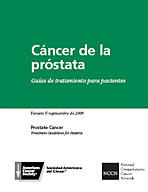May 20, 2007— CHICAGO -- Northwestern University researchers have discovered that a recently identified genetic marker for prostate cancer is linked to a highly aggressive form of the disease.
These findings ultimately will aid the development of a simple blood test to predict who is susceptible to this aggressive cancer, Northwestern researchers said. Knowing which patients carry this genetic marker also will guide doctors in how they treat the cancer.
The Northwestern study showed a strong hereditary component to this aggressive cancer. Prostate cancer patients who carry the genetic marker -- called 8q24 -- are much more likely to have a close family member with the disease. They have a 40 percent chance of having a close family member with prostate cancer. In contrast, prostate cancer patients who do not carry the marker have a 20 percent chance.
The genetic marker is twice as common in African-American men. At least 30 percent of African-American men with prostate cancer carry the genetic marker compared to 15 percent of men of European descent, according to a previous study involving Northwestern.
Prostate cancer is the most common cancer among American men, causing more than 40,000 deaths annually. African-American men have a higher incidence of the disease and get it at a younger age than white men.
"These findings will help us understand the mechanisms underlying prostate cancer," said Brian Helfand, M.D., an assistant research professor of urology at Northwestern's Feinberg School of Medicine, a co-principal investigator of the study and a physician at Northwestern Memorial Hospital. "They hold great promise for the development of new treatments and prevention."
Helfandpresented his findings Sunday, May 20, at the American Urological Association meeting in Anaheim, California.
The study looked at more than 550 prostate cancer patients who had been treated at the Robert H. Lurie Comprehensive Cancer Center at Northwestern University. Researchers wanted to identify the characteristics of prostate cancer in men who were carriers of these genetic markers to see if their cancer differed from that in men who did not carry the gene variant.
"We found the carriers of these 8q24 markers had more aggressive tumors," said Helfand. Patients who were carriers had cancers that were more likely to spread into the lymph nodes and were more difficult to surgically remove.
The patients in the Northwestern study had been treated by William Catalona, M.D., professor of urology and director of the Clinical Prostate Cancer Program at the Robert H. Lurie Comprehensive Cancer Center. Catalona is a co-principal investigator of the study.
"We have the largest and best-detailed prostate cancer population to perform this study because Dr. Catalona has a rich database and follow-up on all of his patients," Helfard said.
The 8q24 genetic variation was originally discovered by deCODE genetics, a biopharmaceutical company in Iceland, in collaboration with Catalona of Northwestern and two other research groups. That study was first reported in Nature Genetics in June, 2006.
Since then, the genetic variant has been widely duplicated by prestigious genetic research groups around the country. This is the first time that a genetic mutation associated with prostate cancer has been found in a large segment of the population.
The initial study by deCODE genetics showed that men who carry the genetic marker have a 60 percent increase in risk of the disease.
Genetic markers, also called alleles, occupy a specific position on a chromosome. The alleles linked to the aggressive prostate cancer found by Northwestern and other labs over the past year are located on the long arm of chromosome 8.

 Pomegranate Juice Slows PSA Rise in men With Recurrent Prostate Cancer After Surgery, Radiation
Pomegranate Juice Slows PSA Rise in men With Recurrent Prostate Cancer After Surgery, Radiation


